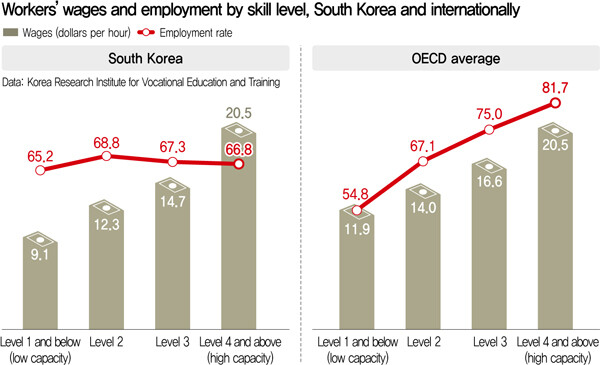hankyoreh
Links to other country sites 다른 나라 사이트 링크
S. Korean economy plagued by skill mismatch

Park Ji-min (29, not her real name) has been looking for a job in the media for three years straight. At first, she only submitted applications to major broadcasters and daily newspapers, but for the past year she has also been applying to relatively small news websites and PR firms.
While Park attended journalism school and got some experience as an intern reporter at a weekly magazine covering current events, the door to the media remains firmly shut. And with media organizations offering fewer positions each year, Park is starting to get nervous. She wonders if she ought to start looking for other jobs before it is too late.
According to a report titled “South Korea’s Skill Mismatch and an International Comparison of Labor Market Outcomes,” recently released by the Korea Research Institute for Vocational Education and Training, South Korea is the only country in the OECD (Organization for Economic Cooperation and Development) in which employees cannot improve their chances of being hired by developing their skills.
This was one of the findings of the 2013 Program for the International Assessment of Adult Competencies (PIAAC), in which the OECD measures the cognitive capacity of adults between the ages of 16 and 25 from its 22 member countries.
In OECD countries, the employment rate is higher on average among high-skilled workers (81.7%) than low-skilled workers (54.8%). But in South Korea, the employment rates for the high-skilled (66.8%) and the low-skilled (65.2%) were nearly the same.
South Korea‘s employment rate for the low-skilled was the second highest in the OECD, after Japan (65.6%), while its employment rate for the high-skilled was the lowest in the group.
“Low-skilled workers in South Korea participate in the labor market despite the low wages, while high-skilled workers try to find a position that is right for their level of skill. But since there are an insufficient number of such jobs, there are limited opportunities for them to participate in the labor market,” the report said.
The international comparison ranked South Korea 15th out of the 22 member countries in terms of workers’ skill level. The reason for the skill surplus in the country is that the skills required for the available jobs are lower still.
In short, there is a severe shortage of good-quality jobs compared to other countries in the OECD.
“The skill surplus in South Korea results from there not being enough good jobs for high-skilled workers and a lot of bad jobs for low-skilled workers. In addition to a complete overhaul of the education and training system, we need to implement policies that lead to corporate innovation and to make the corporate ecosystem more horizontal to promote the creation of good jobs,” suggested Ban Ga-un, an assistant analyst for the Korea Research Institute for Vocational Education and Training, who wrote the report.
In related news, South Korea’s Ministry of Employment and Labor opened the Human Resources Development Committee Support Center and the Work-Study Dual System Results Management Support Center in Sejong City on Monday. The Ministry developed the centers in tandem with the Human Resources Development Service of Korea and the Korea Research Institute for Vocational Education and Training
The Human Resources Development Committee Support Center is supposed to examine the job training market for each region and industry and to provide alternatives based on research into the imbalance in supply and demand for workers.
The Work-Study Dual System Results Management Support Center will be carrying out a fact-finding study to analyze the economic and social costs and benefits of the work-study dual system.
By Jeong Eun-joo, staff reporter
Please direct questions or comments to [english@hani.co.kr]

Editorial・opinion
![[Column] Season 2 of special prosecutor probe may be coming to Korea soon [Column] Season 2 of special prosecutor probe may be coming to Korea soon](https://flexible.img.hani.co.kr/flexible/normal/500/300/imgdb/original/2024/0426/3317141030699447.jpg) [Column] Season 2 of special prosecutor probe may be coming to Korea soon
[Column] Season 2 of special prosecutor probe may be coming to Korea soon![[Column] Park Geun-hye déjà vu in Yoon Suk-yeol [Column] Park Geun-hye déjà vu in Yoon Suk-yeol](https://flexible.img.hani.co.kr/flexible/normal/500/300/imgdb/original/2024/0424/651713945113788.jpg) [Column] Park Geun-hye déjà vu in Yoon Suk-yeol
[Column] Park Geun-hye déjà vu in Yoon Suk-yeol- [Editorial] New weight of N. Korea’s nuclear threats makes dialogue all the more urgent
- [Guest essay] The real reason Korea’s new right wants to dub Rhee a founding father
- [Column] ‘Choson’: Is it time we start referring to N. Korea in its own terms?
- [Editorial] Japan’s rewriting of history with Korea has gone too far
- [Column] The president’s questionable capacity for dialogue
- [Column] Are chaebol firms just pizza pies for families to divvy up as they please?
- [Column] Has Korea, too, crossed the Rubicon on China?
- [Correspondent’s column] In Japan’s alliance with US, echoes of its past alliances with UK
Most viewed articles
- 1‘We must say no’: Seoul defense chief on Korean, USFK involvement in hypothetical Taiwan crisis
- 2Is Japan about to snatch control of Line messenger from Korea’s Naver?
- 3[Editorial] Korea’s surprise Q1 growth requires objective assessment, not blind fanfare
- 4Division commander ordered troops to enter raging flood waters before Marine died, survivor says
- 5No good, very bad game for Korea puts it out of Olympics for first time since 1988
- 6Korea’s 1.3% growth in Q1 signals ‘textbook’ return to growth, says government
- 7[Reportage] On US campuses, student risk arrest as they call for divestment from Israel
- 8N. Korean delegation’s trip to Iran shows how Pyongyang is leveraging ties with Moscow
- 9Flying “new right” flag, Korea’s Yoon Suk-yeol charges toward ideological rule
- 10[Column] Park Geun-hye déjà vu in Yoon Suk-yeol